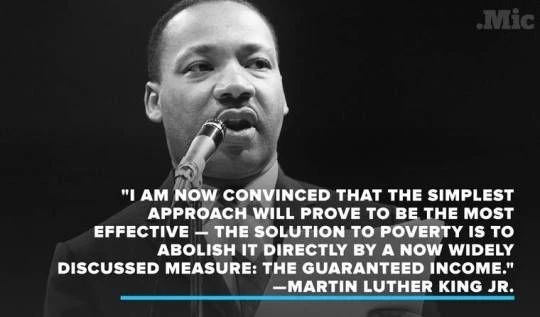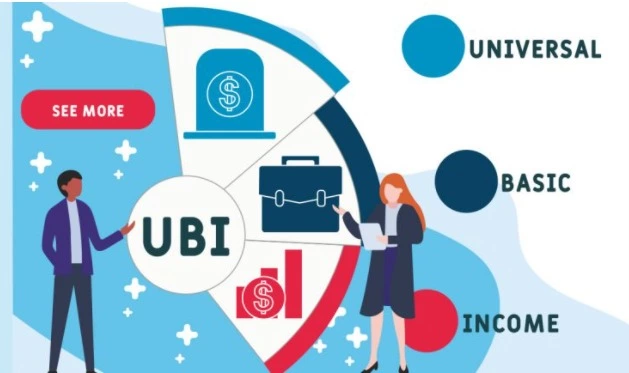DEFINITION:
UBI is a government program in which every adult citizen receives a set amount of money on a regular, unconditional basis. The goals of UBI are to alleviate poverty and economic uncertainty and to replace other need-based social programs. However, as we shall see, there are a variety of interpretations of UBI and a number of schemes have been proposed by its partizans.
The current range of proposals are best understood as a “patchwork of possibilities rather than a single idea or policy. It can mean almost anything to anyone, with one consistent theme: “UBI is about giving money to people for the purpose of solving social and/or economic problems.”

SUMMARY:
-
Luke Martinelli summarised the issues well: “an affordable UBI is inadequate, and an adequate UBI is unaffordable.”
-
Some of the problems with UBI are signalled by its own advocates. Nick Srnicek and Alex Williams in Inventing the Future, write that “the real significance of UBI lies in the way it overturns the asymmetry of power that currently exists between labour and capital.” Its establishment would allow workers to have “the option to choose whether to take a job or not.… A UBI therefore unbinds the coercive aspects of wage labour, partially de-commodifies labour, and thus transforms the political relationship between labour and capital.”
But to do this, the authors insist, it “must provide a sufficient amount of income to live on.” If the payment isn't high enough to let people to refuse work, UBI might push wages down and create more “bullshit jobs.”Despite the key importance of size and the means of implementation, very few texts advocating UBIdiscuss the policy's concrete details. Many of UBI's benefits would only arrive if it provided a generous monthly amount, a moderate or low-amount version could have potentially negative effects.
-
A moderate version from Philippe Van Parijs, of the Basic Income Earth Network calls for a “base” income of €600 ($710), that is not fully added to existing social benefits. This program would cost over 6 percent of GDP in a country like Belgium, with an already high level of social spending and benefitsfor a pretty inadequate increase to the incomes of the poorest.
-
A more generous version such of French economist Yann Moulier-Boutangamounts to €1,100 ($1,302) a month for each citizen and would be added to existing benefits.
In France, it would cost around 35 percent of GDP. The French Socialist party's think tankstudied the budget impact of a €1,000 monthly UBI, it estimated that it would cost as much as all current social spending — pensions, unemployment, social assistance etc plus the budgets for either national education or health care.Our own estimates show that a truly universal UBI of £10,000 per annum in the UK, and replacing all existing benefits would cost over 30% of GDP. In addition to the impact on public finances, the threat to other items of public expenditure, the impact of any resultant increased taxes on the poorest in society, the issue remains that £10,000 is not a substantial annual salary that would give everyone the option to reject work and the “bullshit jobs” as Srnicek and Williams loftily and coarsely dismiss some labour.
-
UBI proposals all accept the basic dynamics of neoliberal capitalism as beyond human control and posit UBI as a solution to the uncertainties, inequality and inequities of the system, see this from the Compass Report of 2016:
“The post-war social security model developed in very specific circumstances and was designed to fit a particular sort of economy as a system of insurance against a range of economic risks… Today the risk of unemployment is higher, low pay and work insecurity has spread, and relative housing costs have risen sharply. These trends have greatly raised the risk of poverty and the demands on the social security and wider welfare system.”
Rather than work to better control these risks and create an economy that works for everyone, Compass and other UBI supporters reify the economy as an ineluctable mechanism whose trajectory cannot be stopped by human agency, all we can do is put in place palliatives such as UBI.
UBI is either an inadequate or unaffordable palliative and a distraction from the real challenge of building an economy and society not dominated by the priorities of the ruling classes. For the London-based Institute for Public Policy Research, UBI “institutionalises the gap between the disproportionate and increasing rewards for the few and stagnant and poor prospects for the many”; a “lazy utopian remedy” that fails to address “issues of class, economic ownership and the productive capacity of the economy.”
The impact of paying two-thirds of the American population $1,000 dollars a month through UBI. Unless the critically important programs on the left-hand bar are eliminated, this UBI programme would need to be paid for by higher taxes or a massive increase in government debt. A taxes-only approach to funding would require a 73% increase in federal revenue. Even if defence spending were to be slashed by one-third, a 52% tax increase would still be required.
https://www.thirdway.org/memo/five-problems-with-universal-basic-income

THE COMPASS PAPER
“Universal Basic Income: An idea whose time has come?”2016.
An interesting paper to analyse as despite being for the concept in principle, its intellectual rigour and core assumptions help highlight some of UBI's fundamental issues.
The Foreword states clearly the basic problem:
“A 2016 survey found 11% of the population aged 16–75 working for online platforms, paid by the task…. Growing numbers …are piecing together a patchwork livelihood from multiple sources, not knowing from one day to the next if or when they will be paid..
(The present benefit system) disadvantages employers who, in a competitive global economy, want to access labour flexibly on demand..it harms the very economy it is supposed to help.”
This betrays a basic acceptance of the norms and priorities of neoliberal society, and implicitly precludes the possibility of creating something different in which labour precarity and the damage it brings no longer exist. It recycles the mantra about the pressures of the “competitive global economy” without questioning whether these pressures need to exist or who benefits from them. As an aside, the economies of the western capitalist nations performed better regarding their own priorities, i.e. those around economic growth, when there was more security of employment, strong unions and less “flexibility” in the labour market.
“A UBI would provide a much more secure income base in an age of deepening economic and social insecurity and unpredictable work patterns.”
It's a palliative that does not attempt to address the underlying causes of the problem.
Their Proposals
How well do their proposals address the symptoms? They have two UBI models: a full scheme (that replaces most means-tested benefits) and a modified scheme (that initially leaves existing means-tested benefits in place). Their conclusions:
- a full scheme replacing all or most of the existing system would be difficult to implement in the present circumstances; too expensive and too many losers among poorer households
- it would be possible to implement a modified scheme, which would raise average incomes at the bottom, reduce poverty levels, significantly for children, and reduce the level of inequality, all at a manageable cost
Back to Martinelli: “an affordable UBI is inadequate, and an adequate UBI is unaffordable.”
The full schemes that they designed all showed an average gain for poorer households but a large number of losers amongst people at the lower end of the distribution, leading to sharp rises in relative child poverty. (due primarily to the rate paid per child not compensating for the loss of child tax credits and the rate paid per adult not covering the means-tested benefits and Working Tax Credit in some cases. This is especially true where benefit claimants are entitled to disability premium for Income Support or Working Tax Credit.
A meagre return for additional costs ranging from £35billion to £43bilion and an increase in the basic tax rate to 30%. For the more expensive scheme, pensioners would receive £151.20 per week, adults over 18, £73.10 and children under 1, £44.30: not enough to forebear and ride the vicissitudes of capitalism.

Their preferred scheme is a modified UBI that keeps many existing means tested benefits, though UBI is accounted for when calculating the benefits and replaces Child Benefit. See the table below, note that basic income tax goes up to 25%, it's currently 20%.

For an additional £8.5billion the scheme has some good elements and some form of UBI like this, essentially a supplement to the current welfare scheme, merits review. But it is not a solution to the problems of relative poverty, economic precarity and the changing nature of work under this capitalism. Nor does it particularly simplify the welfare system, one of the supposed benefits of UBI.
Additionally,the paper itself says that “separate, arrangements would need to be put in place to handle the child care costs that arise from parental employment.” representing additional net costs of up to £14billion on top of the £8billion projected already. There will also befurther net costs for disability and housing. In Compass's own words: “Ultimately, reducing reliance on means-tested housing support will depend on housing policies that would bring current costs down.”
This is an admission that UBI is no panacea and has to be part of an integrated set of solutions to rectify the injustices of class society. Also, Compass do not address the very real possibility of landlords increasing rents in response to any UBI scheme that makes their tenants better off, UBI in isolation has massive limitations, the merits of any scheme can only be judged fully if they are part of an integrated package designed to address both the symptoms and the causes of economic and social injustice.
UBI AS A RESPONSE TO WAGE SUPPRESSION AND LOW EMPLOYMENT
Much of the recent increase in interest in UBI has been provoked by the falling share of wages in world GDP and the emergence of technology that could render many people unemployed. The Compass report:
“..UBI ..would also have an important macro-economic benefit, one which would contribute to better economic resilience. One of the effects of the steady fall in the share of national output going in wages in favour of profits since the late 1970s has been the long-term erosion of economic demand..TheInternational Labour Organization, for example, has shown that nearly all large economies are 'wage-led' not 'profit-led': they experience slower growth when an excessive share of output is colonised by profits, with less going in wages.
Technological advance is likely to intensify this problem…with capital grabbing a disproportionate share of the benefits, contributing to a drag on economic growth.
..the relentless drive by capital to cut costs and boost profits is threatening to destroy the wellspring of economic growth that capitalism requires... when there are no jobs for humans, there will be no consumers with the disposable income to buy the products being so efficiently produced by robots.
A reasonable statement of some of the fundamental problems of our time's capitalism, but UBI is an inadequate and fanciful response.
To illustrate:
If the corporate sector puts one million people out of work on an average salary of £30,000 per annum, they will save £30billion each year. (£30,000 X one million, it will actually be more than that but for the purposes of exposition we will keep it simple)
Ceteris paribus and assuming a corporate tax rate of 25% they will pay an additional £7.5billion tax that year on the increase in their profit.
The one million workers, assuming a tax rate of 20% will pay £6 billion less tax that year so the government is only around £1.5billion better off, assuming that they are able to capture all that increased profitability through corporate tax.
Assume that the workers who have been made unemployed got £10,000 UBI per annum and spent 90% of their post-tax income including UBI, i.e. £30.6 billion perannum.
(Total salaries equal £30 billion, £24 billion post tax paid of 20%, add £10 billion UBI to give a total post-tax income of £34 billion, 90% of this figure is £30.6 billion.)
If they have to rely on their UBI payments they will probably spend all of it, i.e. £1million X10,000 = £10billion. So that's £20.6 billion taken out of consumer spending with the government only being a dubious £1.5billion better off to enable it to compensate without increasing taxes elsewhere.
The increased profits of the firms that makeredundancies will go to already wealthy people/institutions with a much smaller propensity to spend. Theoretically some of it could be spent on increased investment in capital and Research/Development, however recent experience shows that it will go on share-buybacks and other investments in securities including those associated with tax havens.
So in order to compensate for the lost demand the government will be forced into a combination of increased taxes on wealthy and middle-income people, borrowing and/or printing money. Two major constraints here:
- The wealthy are very good at hiding their money, around 10% of world GDP rests in tax havens, their political power also militates strongly against increased taxes on their income, whether it be personal or corporate
- Giving everyone in the UK a UBI of £10,000 per annum is equal to around 32% of UK GDP, that's a significant impact on other expenditures that could alleviate the impact of job losses, ability to raise taxes, borrow more etc.
So even a very generous UBI scheme such as this will not compensate adequately for the effect of mass lay-offs unless the government is prepared to tax the wealthy, ban their havens etc. Even then, the UBI will be inadequate to make up for the fall in consumer demand caused by lay-offs.
UBI does nothing in itself to curtail thepower of the wealthy; if we arrive at a situation in which that group is properly taxed and prevented from seconding their wealth, it is to be hoped that there will be no need for a mass compensatory UBI and mitigating the impact of mass redundancies, as we will have created a very different society and economy.
To quote Daniel Zamora:
'No existing economy can pay for a generous basic income without defunding everything else. We would either have to settle for the minimalist version — whose effects would be highly suspect — or we'd have to eliminate all other social expenditures..Faced with these facts, we should question UBI's rationality.
Until we profoundly transform our economies, we can't implement a measure that would cost more than 35 percent of GDP in economies where the state already spends around 50 percent of GDP. The power relations needed to establish this level of UBI would constitute an exit from capitalism, pure and simple, rendering depictions of UBI as a “means” of social transformation nonsense.
The prospect of a shrinking job market due to increased automation has swollen the ranks of UBI supporters in recent years. Many, including trade unionists, see UBI as a way of mitigating the social and economic downsides of technological change.
Ultimately these predictions accept the mythological assumptionthat the economy exists outside of the control of people, when in fact the economy is created by people who could chose to stimulate employment in the badly needed sectors of health, education and environment if they so desired. UBI is a capitulation to the dominance of neoliberalism, not a robust response to its excesses.
The evidence suggests that technology changes work rather than ends it. The US economy employs more people today than ever, with 37 million jobs added since the introduction of Microsoft Windows in 1993. The chart shows the annual growth rate of jobs in five major occupational groups, listed in order of declining computer use; over half the workers in each of the first three groups used computers at work as of 2001. In all three computer-intensive groups, jobs grew faster than the overall labour force. In other words, computers have caused job losses in some specific occupations, but the net effect on these broad occupational groups has not been technological unemployment. Only manufacturing has experienced a net loss in jobs, 5 million jobs over three decades. Yet employment growth in the rest of the economy offset these losses. One of the core arguments behind the case for UBI, that technology will destroy work, is questionable.
The challenge is to create sufficient, decent jobs that offer a decent wage, fulfilment, and do something worthwhile rather than cater to the caprice of the very wealthy.
https://www.imf.org/external/pubs/ft/fandd/2015/03/bessen.htm

UBI AND INCREASED BARGAINING POWER OF WORKERS
There is a belief that UBI will increase workers' bargaining position. In isolation it is highly unlikely to do so and could exacerbate matters.
Daniel Zamora:
“A low or moderate UBI — too low to let people refuse job offers — could relegate the least qualified people to more intensely precarious situations. As Luke Martinelli puts it:
The lack of an exit option for such workers, and their weak bargaining position with respect to employers, means that basic income could end up exacerbating poor pay and conditions if other workers were willing to reduce their wage demands as a result of the unconditional payment.
Martinelli highlights “the danger that basic income 'would aggravate the problem of low pay and subsidize inefficient employers,' leading to a proliferation of 'lousy' jobs.” In this scenario, those with good jobs will continue to lead fulfilling lives, now supplemented by universal income, while others will have to combine their UBI with one or more “lousy” jobs, with little gain in income. The proposal makes no attempt to help those without a job today get one tomorrow or improve the job they have. Indeed, everything suggests that the opposite will happen: the UBI will function like a war machine for lowering wages and spreading precarious work.”
This is why some right wingers like UBI, it helps keep minimum wages low so not endangering employment according to their fantasy-world models.
“We shouldn't be starting from the premise that too-high wages generate unemployment by disrupting the economy's optimal equilibrium: that's precisely the idea we should fiercely challenge. Indeed, recent studies seriously undermine these claims. Contrary to neoclassical predictions, countries that tax work the most have the highest employment rates because income taxes fund social services, which promote labour market participation, especially for women.”
CONCLUDING ARGUMENTS AGAINST UBI
- Making cash payments to individuals to increase their purchasing power in a market economy is not a viable route to solving problems caused or exacerbated by neoliberal market economics.
- There is no evidence that any version of UBI can be affordable, inclusive, sufficient and sustainable at the same time. UBI can encourage an individualist, consumerist approach to welfare that pits UBI recipients against universal state welfare provision in a race to the bottom.
- There is no evidence that UBI will help to increase the bargaining power of workers and trade unions, or solve problems of low pay and precarious work. On the contrary, it is reasonable to see UBI as a mechanism for weakening already much enfeebled collective bargaining systems.
- UBI will have limited impact on inequality or addressing the power asymmetries deriving from that inequality and the psychological impacts therefrom. Inequality in itself is damaging, see The Spirit Level
The increased need for public borrowing necessitated by some of the more generous UBI schemes, particularly in the face of mass unemployment (see above) will also contribute to increased inequality, see here: - Rapidly changing labour markets, inadequate welfare systems, poverty, inequality and powerlessness are complex problems that call for complex changes on many levels: UBI is no silver bullet.
- The campaign for UBI threatens to divert political energies and funds from more important causes.
- Resources can be marshalled to bring greater security, opportunity and power to all people; the money needed to pay for an adequate UBI scheme would be better spent on reforming society, social protection systems, and better, more far reaching. quality public services.
Many proponents of UBI see it as a means to fix problems of concern to the Left: the debate does at least create important opportunities for us to advocate for quality public services, progressive labour and welfare reform, whilst criticising the reality of UBI proposals and using that critique as means of exposing the fundamental fault lines in capitalism. We should be carefulin these debates to avoid alienating proponents of UBI who are potential allies.
A NOTE ON UBI TRIALS
The practical trials described therein vary enormously in scale and funding source, as well as in their political and economic context. They have seldom lasted long enough to test viability over more than a few years, and there is limited high-level evidence relating to UBI defined as unconditional, regular cash payments to individuals regardless of their income or status.
Almost all practical experiments have in fact been conditional and tell us nothing about the impact of making cash payments to all regardless of income or status or the affordability of such schemes across whole countries or regions.
ALTERNATIVE SOLUTIONS
To be dealt with in a separate article.Some concluding words from Daniel Zamora:
“The considerable sum of money mobilized (in UBI schemes) has only a modest effect on poverty and doesn't specifically benefit those who need it most…
This fact is even more striking when we consider that the cost of eradicating poverty in any developed country is around 1 percent of GDP. An individual unemployment benefit set at the poverty line (around $1,200 a month) and granted to all jobless individuals regardless of their place in the family structure would not only pull everyone out of poverty but also end workfare, challenge the normative dimensions of family structures, and fundamentally alter the labour market. All this, for somewhere between six to thirty-five times less money than a universal basic income.”
Zamora's plan and the abolition of low pay through legislation and the restoration of Trade Union rights form the bases of an alternative set of solutions along with the counterproposal of Universal Basic Services. We should call for the debate around universalism to be re-orientated towards a meaningful right to affordable, decent housing, universal education, health, social care and other necessary servicessuch as public transport and the enhancement of environmental standards.
UBI should not be totally dismissed; however, it is a poor substitute for real change and can be a veil for the lack of any real political will to make that change.






